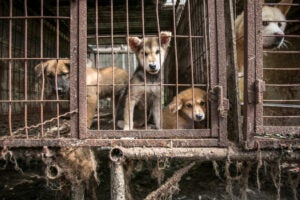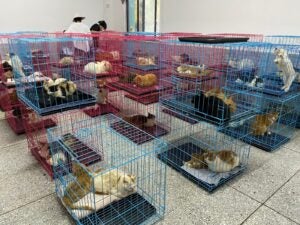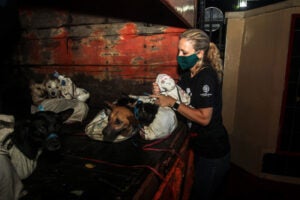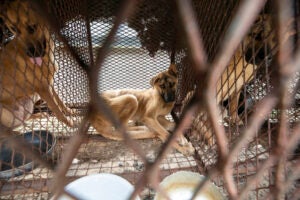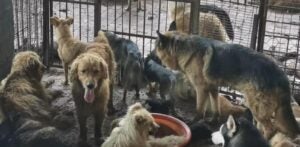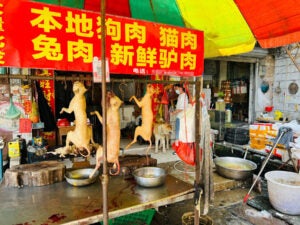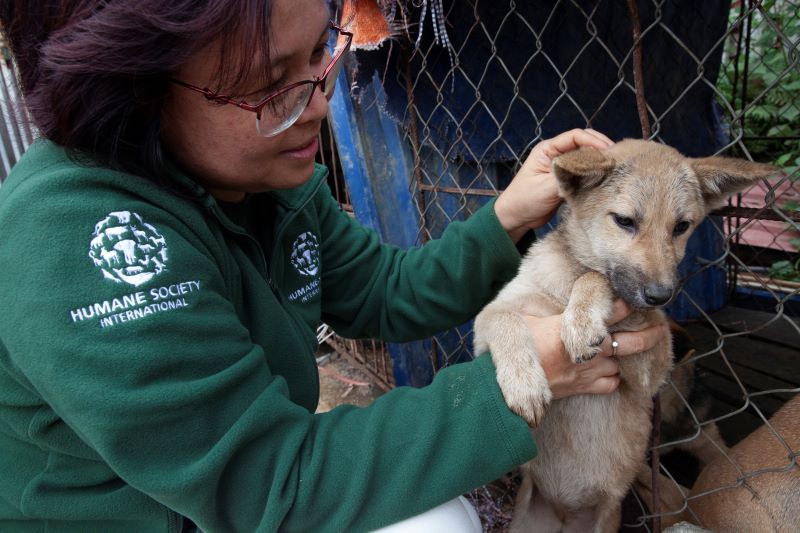
The dog and cat meat trade in Viet Nam
Every year in Vietnam, an estimated five million dogs and one million cats are captured, stolen, trafficked and brutally slaughtered for their meat. This trade is not only marked by extreme animal cruelty but also involves significant criminal activity. To capture dogs, traders often resort to using poisoned bait tasers, and iron pincers, while cats are trapped using spring-loaded snares. Pets are frequently stolen from homes, and animals are trafficked across borders from neighboring countries such as Laos, Cambodia and China.
During transport, the animals are crammed into small cages and loaded onto trucks for grueling journeys that can last several days. Throughout this ordeal, they are deprived of food, water and rest, leading to some dying from suffocation, dehydration and heatstroke before reaching their final destination—a restaurant, market or slaughterhouse where they are killed and sold on as dog or cat meat.
Threat of rabies
The dog meat trade is not only inhumane but also poses significant public health risks, especially concerning the spread of rabies. Vietnam continues to see approximately 70 human deaths each year from rabies, with most cases linked to dog bites. The trade in dogs of unknown disease or vaccination status undermines anti-rabies efforts and endangers everyone involved.
Growing local opposition to the trade
Viet Nam is somewhat unique in Asia regarding the relatively widespread consumption of dog and cat meat. Unlike most countries on the continent, where such practices are limited to a small minority, a recent Nielsen poll from September 2023 commissioned by HSI revealed that nearly 40% of the Vietnamese population consumes dog meat, while 21% eat cat meat. Dog meat is particularly popular among men in northern Viet Nam, while cat meat dishes are especially common in Hanoi and the northern province of Thai Binh.
Despite this, there is growing local opposition to these trades, especially among young people and pet owners. Nationally, 64% of people support a ban on dog meat consumption, and 68% support banning the dog meat trade. Similarly, 71% of the population favors a ban on both the consumption and trade of cat meat. The primary reasons for this opposition are a strong aversion to the cruelty involved and the belief that dogs and cats are companion animals, not food. This sentiment is likely driven by the increasing number of pet owners in Viet Nam; 87% of poll respondents reported having directly or indirectly experienced the theft of a pet for the trade.
Our work in Viet Nam
HSI is dedicated to tackling the dog and cat meat trade in Viet Nam by advocating for stronger laws and regulations that prohibit these practices on the grounds of animal welfare, public health and safety and stopping illegal cross border movement of animals.
We aim to raise awareness among both the government and the public about the inherent cruelty, the illegal nature of the trade, the emotional toll on pet owners and the significant public health risks linked to rabies. By amplifying the voices of Viet Nam’s growing community of pet owners and animal lovers, we seek to influence policymakers in favor of reform while also working to reduce demand for dog and cat meat. Our goal is to secure a nationwide ban on the slaughter and consumption of dogs and cats in Viet Nam.
As part of our program in Viet Nam we are collaborating with the authorities in two target provinces, Thai Nguyen and Dong Nai, to launch initiatives aimed at reducing the dog and cat meat trade and dog and cat meat consumption in each province. This involves enforcing existing laws, such as health and safety regulations, environmental regulations and animal welfare laws to restrict the trade and training local law enforcement agencies to combat it effectively. Additionally, we deliver community initiatives in these provinces that raise awareness of the risks of the dog and cat meat trade, encourage responsible pet ownership, support pet sterilization and increase canine rabies vaccination coverage.
Additionally, after years of success with our Models for Change program in South Korea, we launched this initiative in Viet Nam in 2022. While most animals for the trade are either stray animals caught from the streets or stolen pets, some dogs and cats are farmed for the meat trade. These farms are not farms in the traditional sense but are rather facilities where young dogs and cats, often unwanted litters, are sold by their owners into the trade, where they are fattened on farms and then slaughtered. We are working directly with farmers who want to leave this cruel trade behind and transition to alternative humane livelihoods. Our Models for Change program not only enables workers to leave the trade but also allows for the rescue of dogs and cats who are voluntarily handed over to HSI as part of the closure, ending their suffering and the suffering of dogs and cats who would have been slaughtered in the future. The dogs and cats we rescue from the meat trade receive veterinary care and rehabilitation at our partner shelter facilities. Once restored to full health, these animals are available for local adoption, enabling them to find safe and loving homes.


